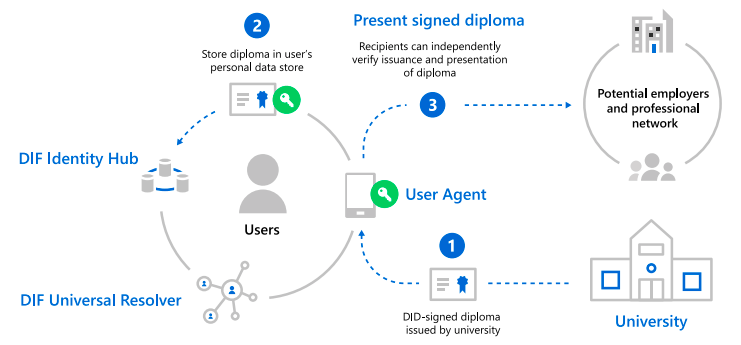In a white paper released this week, Microsoft introduced blockchain-powered decentralised identities (DID) to protect customers’ digital assets. Unlike today’s account-based systems, DIDs are self-owned and operate independent of any company or government to ensure greater security.
Growing concerns over privacy practices prompted Microsoft to explore alternative identity verification methods.
“Users have developed a habit of using the same identifier and password across a wide array of products and services. This results in poor security and an association and tracking of accounts.”
Instead of these outdated and inefficient security measures, Microsoft users themselves will provide all the verification necessary to access their unified identities which are transferable across platforms.
The company says that “DIDs possess unique characteristics, like greater assurance of immutability, censorship resistance, and tamper evasiveness.”
How It Works
DIDs are globally unique identifiers connected to Microsoft’s Decentralised Public Key Infrastructure (DPKI). For this infrastructure to function, a larger decentralised system is required. This is currently what Microsoft is building.
To access their DID, a person must first use a user agent application which is linked to the system. Some user agents may take the form of a wallet, similar to cryptocurrency ones. But instead of money, they store something more valuable: your identity.
Asides from wallets, personal data may also be stored on so-called “identity hubs” supported by Microsoft’s cloud computing service Azure.
“DIDs paired with Identity Hub personal data stores enable the creation of a new class of apps and services. They store data with the user’s Identity Hub and operate within the confines of the permissions they are granted.”
A New Market
Foreseeing widespread adoption of the technology, Microsoft hopes to capitalise on the relative lack of activity in the market.
Microsoft outlines the applications of DIDs for a range of users — from students to employers, jobseekers to retirees.
As the diagram below explains, the DIDs of university students could be filled with diplomas and letters of recommendation for employers and head hunters.
Students could use their educational documents to reinforce the security of their DID while also making their certification accessible to professional networks.

But students aren’t the only targeted users. Anyone could keep their banking documents, medical files and more in one single secure place. The question is, would you trust it enough to?
Once DIDs are launched, this is an issue Microsoft will be confronted with.
Keeping it Decentralised
In the white paper, Microsoft made it clear that decentralisation is the priority.
This means creating DIDs which can interact with other platforms such as uPort. Designed to give Ethereum users more control over their profiles and identity verification methods, uPort functions similar to Microsoft’s DIDs on a much smaller scale.
But the two companies are not competitors. Instead, uPort editor Kames Cox-Geraghty sees a future of decentralisation and collaboration.
In a statement to press, Cox-Geraghty explained that “our team is highly motivated to stay interoperable and in constant communication with other decentralised identity providers.”
Microsoft feels the same way.
In an interview with Coindesk last month York Rhodes, Microsoft’s blockchain engineering team manager, stressed the importance of avoiding social media’s mistakes. He describes the pitfall of popular networking sites,
“…where you can’t connect an identity from LinkedIn to Twitter, to Facebook, to WeChat, to Weibo. If I create my identity in a Microsoft system, if somebody comes along with a MetaMask or uPort or any other wallet, they should actually be able to understand what that identity is.”
Microsoft has a way to go before launching DIDs. But with the blockchain community’s cooperation and help, this decentralised reality may not be far off.